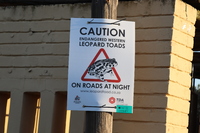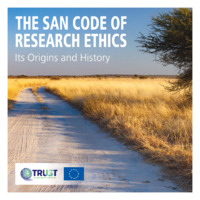Ethical Considerations
The San and Khoi today inherit a history of unacknowledged land theft, dispossession, forced exile, massacre, and genocide. The San & Khoi Digital Archive aims to not only acknowledge this past but also recognises the role of rebuilding the linguistic landscape of loss for healing, restoration, and dignity.
This ‘relic-ism’ of indigenous communities, who still to this day possess embodied and at times eviscerated ways of understanding of humanity’s deepest self, has contributed in crippling ways to how descendant communities relate to their brutalised and disavowed histories being taught back to them.
The colonial archival venture and its associated disciplined knowledges resulted in the alienation of indigenous knowledge holders, and communities from mainstream knowledge production processes. The extraction of Indigenous Knowledge Systems (IKS) provided for a centuries-old scientific and academic industry in South Africa, as elsewhere on the continent and globally. The result is that IKS repositories around the world are stored inaccessibly, or placed disparately in bits and pieces in places such as research institutions, museums, universities, and libraries.
The motivations that underpin this archive is the acknowledgement of linguicide (attempted erasure of language), epistemicide (attempted erasure of knowledge), and the historical injustices suffered as a result of massacre, genocide, land dispossession and forced removals.
The return of the indigenous mother tongues presents possibilities for transformation, the healing of the body and memory, and the centring of marginalised ancient knowledges.
The protection and recognition of endangered languages results in increased multilingualism, and increased intercultural understanding of shared heritage, increased knowledge and understanding of landscape, and its significance, through a decolonised research process.
The San Code of Research Ethics
The San Code of Ethics is the product of a 16-year process of stakeholder engagement across Southern Africa committed to the formulation of a Code of Ethics that aims to deal with challenges the San communities have faced.
Its guiding principles are
- Respect. To the environment, to San leaders and individuals, to cultural value.
- Honesty, integrity, honour between all partners.
- Cultural and spiritual values must be fully honoured and respected in all research and media projects.
- The right formal process, application and approval, should be followed to protect communities in research.
- A prioritization of processes should be identified and followed (i.e. first apply, engage, debate, get approval, report back, etc.)
- Informed consent is central to all research.
- Genetics samples should only be used for the purpose stated in the application and research contract. For further research on the sample, further consent must be sought.
- Researchers should not enter a community without being guided and led by members of the community itself.
- Mutual benefits should be ensured where possible. Both researcher and community should benefit from the interaction.
Principles of the San Code of Ethics
RESPECT
We require respect, not only for individuals but also for the community.
We require respect for our culture, which also includes our history.
We have certain sensitivities that are not known by others.
Respect is shown when we can input into all research endeavours at all stages so that we can explain these sensitivities.
Respect for our culture includes respect for our relationship with the environment.
Respect for individuals requires the protection of our privacy at all times.
Respect requires that our contribution to research is acknowledged at all times.
Respect requires that promises made by researchers need to be met.
Respectful researchers engage with us in advance of carrying out research.
There should be no assumption that the San will automatically approve of any research projects that are brought to us.
We have encountered lack of respect in many instances in the past.
In Genomics research, our leaders were avoided, and respect was not shown to them. Researchers took photographs of individuals in their homes, of breastfeeding mothers, or of underage children, whilst ignoring our social customs and norms. Bribes or other advantages were offered. Failure by researchers to meet their promises to provide feedback is an example of disrespect which is encountered frequently.
HONESTY
We require honesty from all those who come to us with research proposals.
We require an open and clear exchange between the researchers and our leaders.
The language must be clear, not academic. Complex issues must be carefully and correctly described, not simply assuming the San cannot understand.
There must be a totally honest sharing of information.
Open exchange should not patronise the San. Open exchanges implies that an assessment was made of possible harms or problems for the San resulting from the research and that these possible harms are honestly communicated.
Prior informed consent can only be based on honesty in the communications, which needs to be carefully documented.
Honesty also means absolute transparency in all aspects of the engagement, including the funding situation, the purpose of the research, and any changes that might occur during the process.
Honesty requires an open and continuous mode of communication between the San and researchers.
We have encountered lack of honesty in many instances in the past.
Researchers have deviated from the stated purpose of research, failed to honour a promise to show the San the research prior to publication, and published a biased paper based upon leading questions given to young San trainees.
This lack of honesty caused much damage among the public, and harmed the trust between the collaborating organisation and the San.
Another common lack of honesty is exaggerated claims of the researcher’s lack of resources, and thus the researchers’ inability to provide any benefits at all.
JUSTICE AND FAIRNESS
We require justice and fairness in research. It is important that the San be meaningfully involved in the proposed studies, which includes learning about the benefits that the participants and the community might expect.
These might be largely non-monetary but include co-research opportunities, sharing of skills and research capacity, and roles for translators and research assistants, to give some examples.
Any possible benefits should be discussed with the San, in order to ensure that these benefits do actually return to the community. As part of justice and fairness the San will try to enforce compliance with any breach of the Code, including through the use of dispute resolution mechanisms.
In extreme cases the listing and publication of unethical researchers in a “black book” might be considered.
An institution whose researchers fail to comply with the Code can be refused collaboration in future research.
Hence, there will be “consequences” for researchers who fail to comply with the Code.
We have encountered lack of justice and fairness in many instances in the past.
These include theft of San traditional knowledge by researchers. At the same time, many companies in Southern Africa and globally are benefitting from our traditional knowledge in sales of indigenous plant varieties without benefit sharing agreements, proving the need for further compliance measures to ensure fairness.
CARE
Research should be aligned to local needs and improve the lives of San. This means that the research process must be carried out with care for all involved, especially the San community. The caring part of research must extend to the families of those involved, as well as to the social and physical environment. Excellence in research is also required, in order for it to be positive and caring for the San. Research that is not up to a high standard might result in bad interactions, which will be lacking in care for the community. Caring research needs to accept the San people as they are, and take note of the cultural and social requirements of this Code of Ethics. We have encountered lack of care in many instances in the past. For instance, we were spoken down to, or confused with complicated scientific language, or treated as ignorant. Failing to ensure that something is left behind that improves the lives of the San also represents lack of care.
Source and credit: Southern African San Institute, 2017. San Code of Research Ethics [Online]. Available from:https://www.globalcodeofconduct.org/wp-content/uploads/2018/04/San-Code-of-RESEARCH-Ethics-Booklet_English.pdf





